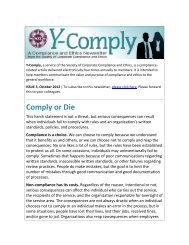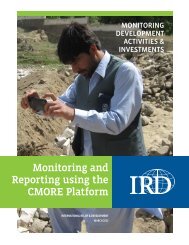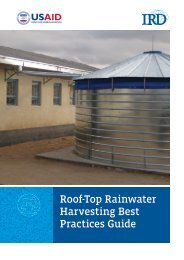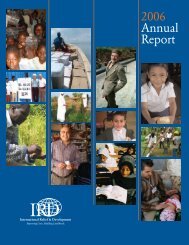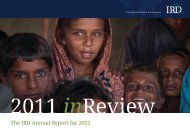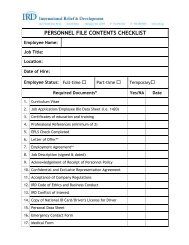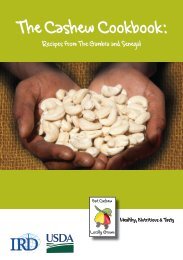Empowering citizens Engaging governments Rebuilding communities
Empowering citizens Engaging governments Rebuilding communities
Empowering citizens Engaging governments Rebuilding communities
You also want an ePaper? Increase the reach of your titles
YUMPU automatically turns print PDFs into web optimized ePapers that Google loves.
Quandour joined IRD in June 2003, for the<br />
beginning of ICAP. He took a leap of faith with<br />
IRD, an organization barely 5 years old but<br />
under intense pressure to show quick results<br />
Box 2<br />
Awni Quandour: IRD’s original elder statesman<br />
1<br />
It was June 2009, and Gary Kinney had spent almost two months in Baghdad on temporary assignment, anxious<br />
to get home. “Neither sandstorms nor faulty documentation would have been welcome delays,” Kinney wrote in<br />
an email, detailing his bumpy exit from Iraq via Jordan. Kinney, who at the time was IRD’s contracts and grants<br />
manager, avoided a sandstorm, but his documentation proved more troublesome. Passport control officers at the<br />
Baghdad airport flagged his visa for being incomplete or incorrect. Whatever the reason, Kinney found himself<br />
stuck.<br />
“Two officers were in the booth, handing my passport back and forth, without any ability to solve the problem,” he<br />
said. Eventually, the men called for their supervisor, who came and led Kinney to a private airport office.<br />
Building community trust<br />
“Do you have a CAC card?” the official asked, referring to the Common Access Card issued as a standard identification<br />
by the Department of Defense. No, Kinney replied, he did not. “Do you have an MNF-I card?” he then asked,<br />
referring to another type of identification issued to workers entering and leaving Iraq. Kinney didn’t have one of those<br />
either.<br />
What he did have, however, was his IRD identification badge, which he pulled from his wallet. The Iraqi official gave it<br />
a quick glance and then, after verifying that Kinney was traveling to Amman, promptly returned the ID. Then, without<br />
further delay and in one brisk motion, he approved the visa, stamped the passport, and cleared Kinney to leave—with<br />
a parting message: “Tell Mr. Awni that Captain Zain sends his regards.”<br />
A few months later, Awni Quandour, 56, died of lung cancer at a hospital in Amman. Instrumental in helping IRD set<br />
up its initial operations in the Middle East, Quandour at the time was serving as IRD’s country director in Jordan,<br />
where his family had lived for more than 100 years and where he had built a respected reputation doing communitybased<br />
economic development work, including for the Noor Hussein Foundation. During a 2008 Capitol Hill ceremony<br />
celebrating IRD’s 10-year anniversary, Jordan’s Queen Noor publicly commended Quandour for his work. “Awni was a<br />
great man,” said Dr. Arthur B. Keys, IRD’s founder and president, “and a major source of insight and information to<br />
many, many key decisionmakers.”<br />
Quandour joined IRD in June 2003, for the beginning of ICAP. He had already spent a lot of time in Iraq, working for<br />
Catholic Relief Services during the 1990s, and he had an in-depth knowledge of the country and its people. He took<br />
a leap of faith with IRD, an organization barely 5 years old but under intense pressure to show quick results in an<br />
unstable country where it had no organizational footprint—or local staff. Quandour came on board anyway.<br />
He first met Keys in Amman, at a USAID organizing meeting for ICAP implementing agencies. IRD volunteered to<br />
work in the capital, where the needs were most widespread and immediate. “Awni and I traveled across the desert in<br />
a fast, unarmed convoy to set up IRD’s initial ICAP program in Baghdad,” Keys said. “We went out into the neighborhoods,<br />
visited families in their homes, visited mosques and universities.”<br />
(continued)<br />
11


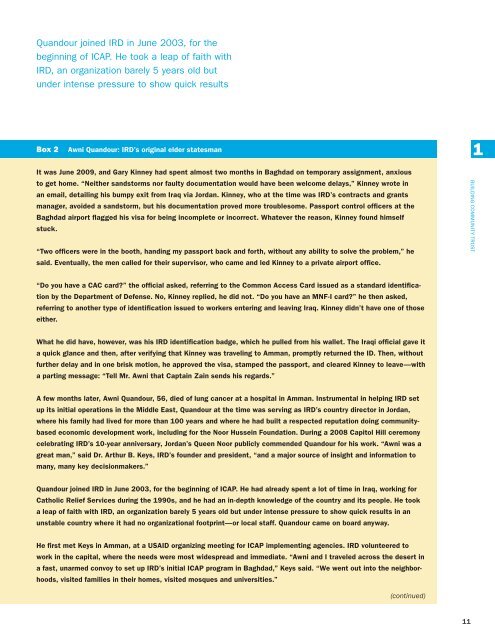
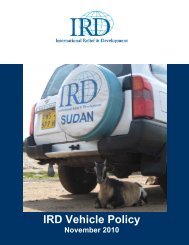
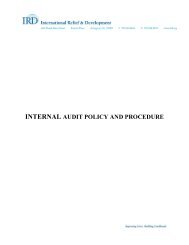
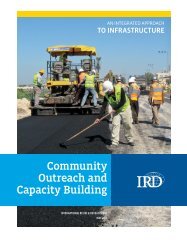
![Guide bonne pratique production d'oignon qualité_VF_4_2411012[1]](https://img.yumpu.com/23506639/1/184x260/guide-bonne-pratique-production-doignon-qualitac-vf-4-24110121.jpg?quality=85)

